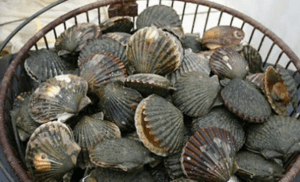 Recreational bay scallop season harvest will close Sept. 25 in Gulf County through northwest Taylor County, and in Levy through Hernando counties.
Recreational bay scallop season harvest will close Sept. 25 in Gulf County through northwest Taylor County, and in Levy through Hernando counties.
The last day harvest will be open is Sept. 24.
Once these areas close, scallop harvest will not reopen until the 2021 season, the dates of which are noted below.
For information on bay scallop regulations, visit MyFWC.com/Marine and click on “Recreational Regulations” and “Bay Scallops” under the “Crabs, Lobster and other Shellfish” tab.
St. Joseph Bay/Gulf County: Aug. 16 through Sept. 24. This region includes all state waters from the Mexico Beach Canal in Bay County to the westernmost point of St. Vincent Island in Franklin County.
Franklin County through northwestern Taylor County (including Carrabelle, Lanark and St. Marks): July 1 through Sept. 24. This region includes all state waters from the westernmost point of St. Vincent Island in Franklin County to the mouth of the Fenholloway River in Taylor County.
The remaining portion of Taylor County and all of Dixie County (including Keaton Beach and the Steinhatchee area): June 15 through Labor Day. This region includes all state waters east of Rock Island near the mouth of the Fenholloway River in Taylor County and north of Alligator Pass daybeacon #4 near the mouth of the Suwannee River in Levy County.
Levy, Citrus and Hernando counties (including Cedar Key, Crystal River and Homosassa): July 1 through Sept. 24. This region includes all state waters from the mouth of the Suwannee River in Levy County to the Hernando – Pasco county line.
Pasco County: Open for 10 days starting the third Friday in July. This region includes all state waters south of the Hernando – Pasco county line and north of the Anclote Key Lighthouse including all waters of the Anclote River.
Boater and scalloper safety
Be safe when diving for scallops. Wear a life jacket when underway and do not drink and boat. When scalloping in open water, divers should stay within 300 feet of a properly displayed divers-down flag or device, and within 100 feet of a properly displayed divers-down flag or device if on a river, inlet or navigation channel. Boat operators traveling within 300 feet of a divers-down flag or device in open water or within 100 feet of one on a river, inlet or navigational channel must slow to idle speed. For more information, visit MyFWC.com/Boating/Regulations and click on “Divers-down Warning Devices.”
Stow it, don’t throw it
Please do not discard scallop shells in inshore waters commonly used for recreational activities such as near boat ramps or swimming areas. Piles of discarded scallop shells can create hazards for swimmers and damage seagrass habitat. Scallop shells can be discarded in a trash receptacle or in larger bodies of water where they are more likely to disperse.
Citizen Science
Done for the day? Help FWC’s scallop researchers by completing an online survey at svy.mk/bayscallops. Harvesters can indicate where they harvested scallops, how many they collected and how long it took to harvest them. Participants can email BayScallops@MyFWC.com to ask questions or send additional information.
Learn more about how FWC scientists monitor Florida’s scallops by visiting MyFWC.com/Research and clicking on “Saltwater,” “Bay Scallops” and “Bay Scallop Season and Abundance Survey.”


